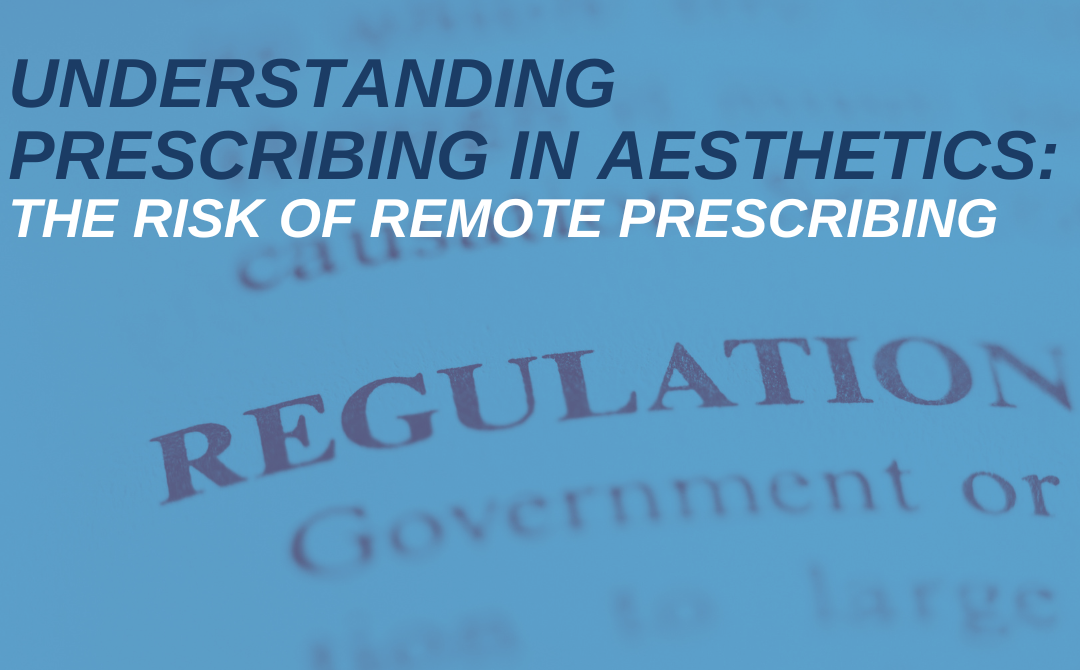Understanding Prescribing in Aesthetics
When it comes to aesthetics, there are many subjects that regularly reappear in conversation. One of those subjects is around remote prescribing. Prescription-only medicines (POMs), such as botulinum toxin, require a valid prescription before they can be administered. However, there is sometimes confusion about the prescribing process.
If you are a medical professional who does not hold a prescribing qualification, you can still train in and perform Toxin procedures, but prior to treatment, every single one of your toxin patients must be seen by a prescriber and undergo a medical consultation. This allows the prescriber to ensure it is safe for the patient to have the treatment carried out.
What Is Remote Prescribing?
Remote prescribing refers to the practice of issuing prescriptions without an in-person consultation, often via phone or video call. While this was once common in aesthetics, remote prescribing for aesthetic treatments was banned in 2012 by the General Medical Council (GMC). This ruling was later reinforced by the Nursing and Midwifery Council (NMC), the General Dental Council (GDC), and the General Pharmaceutical Council (GPhC).
The Joint Council for Cosmetic Practitioners (JCCP) explicitly states that remote prescribing is not permitted for injectable, topical, or oral medications used in non-surgical cosmetic procedures. This includes:
- Botulinum toxins
- Injected local anaesthetics
- Topical adrenaline
- Weight loss treatments
- Kenalog (for hay fever or skin conditions)
- Emergency medicines like Hyalase
Without an in-person consultation, it is impossible to accurately assess a patient’s medical history, allergies, and overall suitability for treatment, which can pose serious health risks.
Consequences of Remote Prescribing
If a prescriber is found engaging in remote prescribing for cosmetic treatments, they risk being called before their governing body’s Fitness to Practice Committee.
If prescribers are found to have engaged in remote prescribing for cosmetic procedures such as via a video or phone call, they are liable to be called before their governing body’s Fitness to Practice Committee to judge the potential risk they may pose to public safety.
Consequences may include:
- A formal caution
- Temporary suspension
- Being struck off from professional registration
Additionally, pharmacies now require confirmation of a face-to-face consultation before dispensing prescribed aesthetic treatments. Falsely confirming a consultation took place could be considered fraudulent, this would conflict with governing body guidance.
Insurance policies require practitioners to follow prescribing laws and the guidelines of their professional governing body. If a claim arises from a treatment that did not follow proper prescribing procedures, the insurance policy may be invalid, leaving the practitioner personally liable for legal costs and compensation.
Don’t Risk It – Face-to-Face It!
Ultimately, patient safety should be the top priority. A face-to-face consultation ensures that:
The patient’s medical history is thoroughly assessed
The treatment is safe and suitable for the individual
Any potential contraindications are identified
The prescriber can provide appropriate aftercare guidance
Practitioners should not be complicit and accept ‘remote’ prescriptions from their prescribers. Prioritise safety. Protect your profession.
Don’t Risk it – Face to Face it!

Jayne Beckett RN INP
Founder – Aesthetics Associates
Aesthetics Associates has been providing a connection service for practitioners requiring a qualified, aesthetically trained and insured prescribers for face-to-face medical consultations for 15 years. For information on our prescriber connection service, please feel free to contact us on [email protected] or 0121 384 2717 or click here.

